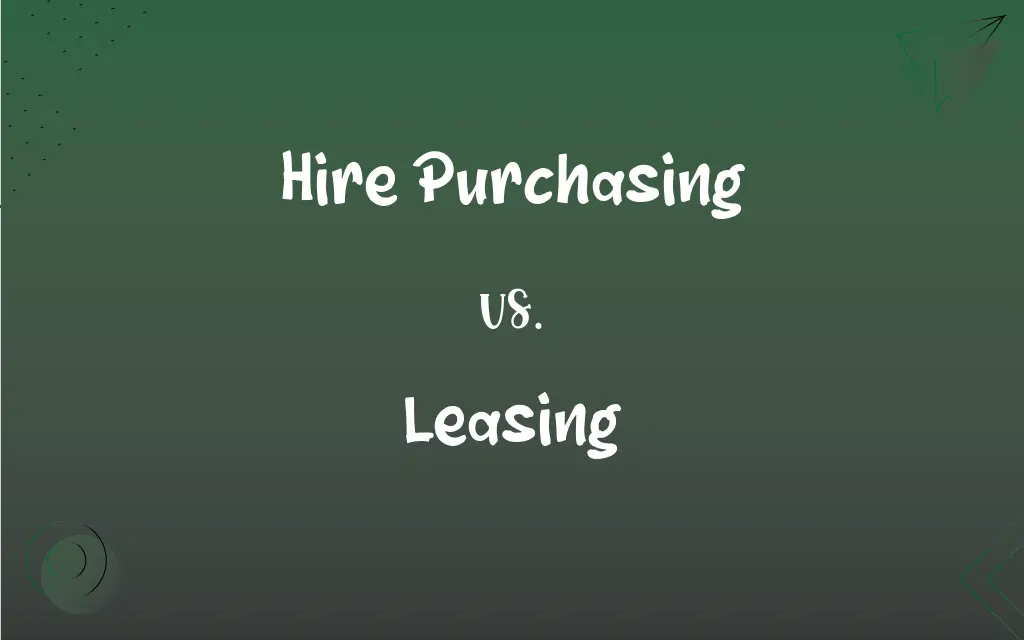Hire Purchasing vs. Leasing: What's the Difference?
Edited by Aimie Carlson || By Janet White || Published on February 14, 2024
Hire purchasing is a method of acquiring assets by paying in installments and owning them after the final payment, while leasing involves renting an asset without ownership transfer.

Key Differences
Hire purchasing is a financial arrangement where a buyer makes payments in installments and eventually owns the asset. Leasing, in contrast, is a rental agreement where the lessee pays for using an asset but does not own it. Both offer ways to use expensive assets without immediate full payment.
In hire purchasing, the buyer gains ownership of the asset after all installments are paid. Leasing differs as the lessee never gains ownership, but typically pays a lower monthly amount than in hire purchasing. Both methods are used for assets like vehicles and machinery.
The hire purchasing agreement entails a final payment, often called a balloon payment, after which ownership is transferred. Leasing agreements, however, may include options to renew the lease, purchase the asset, or return it at the end of the lease term. Both options impact long-term financial planning differently.
With hire purchasing, the buyer is responsible for the maintenance and insurance of the asset throughout the agreement. In leasing, these responsibilities often remain with the lessor, providing a hassle-free experience for the lessee. Both arrangements have distinct implications for asset management.
Hire purchasing can be more cost-effective in the long term for those intending to keep the asset. Leasing is often preferred for short-term use or for assets that depreciate quickly. Both options should be considered based on the financial and usage needs of the individual or business.
ADVERTISEMENT
Comparison Chart
Ownership
Transferred after final payment
Never transferred
Payment Structure
Installments lead to ownership
Regular payments for use
Asset Responsibility
Buyer's responsibility throughout
Lessor's responsibility usually
Agreement Flexibility
Less flexible, aimed at ownership
More flexible, with options to renew or return
Financial Implication
Can be cost-effective for long-term ownership
Preferable for short-term or depreciating assets
ADVERTISEMENT
Hire Purchasing and Leasing Definitions
Hire Purchasing
A contractual pathway to asset ownership, spread over time with installment payments.
They chose hire purchasing for their new kitchen appliances to ease financial pressure.
Leasing
An arrangement where a lessee pays to use an asset owned by the lessor.
He saved capital for his startup by leasing the necessary machinery.
Hire Purchasing
A purchase system where the buyer takes possession before paying the full amount.
The company opted for hire purchasing to manage cash flow while updating its fleet.
Leasing
A financial strategy to use assets without bearing the full cost of ownership.
Leasing high-end technology equipment helped the firm stay updated without large investments.
Hire Purchasing
An installment-based acquisition plan, culminating in asset ownership.
Through hire purchasing, she was able to own her first high-end camera.
Leasing
A contractual agreement for using an asset against periodic payments.
Leasing their office space was more feasible than purchasing it.
Hire Purchasing
A method to acquire expensive assets with periodic payments until full price is paid.
Their new office equipment was acquired through hire purchasing.
Leasing
Renting an asset for a specified period without ownership transfer.
The business decided on leasing a new copier to avoid upfront costs.
Hire Purchasing
An agreement where payments are made in installments for eventual ownership.
She bought her car on hire purchasing, becoming the owner after the last payment.
Leasing
A method to access assets temporarily, often for business or personal use.
They found leasing a car more practical than buying one during their two-year stay abroad.
Leasing
The act of lying.
Leasing
A lie; a falsehood.
Leasing
(archaic) A lie; the act of lying, falsehood.
Leasing
Gerund of lease
Leasing
Present participle of lease
Leasing
The act of lying; falsehood; a lie or lies.
Thou shalt destroy them that speak leasing.
Blessed be the lips that such a leasing told.
FAQs
What is hire purchasing?
Hire purchasing is a financing arrangement where an item is rented until the final payment is made, at which point ownership transfers to the renter.
Is maintenance included in hire purchasing agreements?
No, maintenance is usually the responsibility of the hirer in a hire purchasing agreement.
Who is responsible for asset maintenance in a lease?
Maintenance responsibility varies and should be specified in the lease agreement. It's often the lessor's responsibility.
How does hire purchasing differ from leasing?
In hire purchasing, the hirer gains ownership after all payments are made; in leasing, the lessee typically returns the asset at the lease's end.
Do hire purchase agreements typically include interest?
Yes, hire purchase agreements usually include interest on the payment installments.
Can leased assets be purchased at the end of the lease term?
Some leases offer the option to purchase the asset at the end of the lease, but this depends on the lease agreement terms.
Is it easier to upgrade assets with leasing?
Yes, leasing often makes it easier to upgrade to newer models at the end of the lease term.
Who holds the title of the asset in a hire purchasing agreement?
The title is held by the vendor or finance company until the final payment is made.
What is leasing?
Leasing is a contractual agreement where one party (lessor) allows another (lessee) to use an asset for a specified period in exchange for periodic payments.
Are there tax benefits to leasing?
Yes, lease payments are often tax-deductible as business expenses.
Can hire purchase agreements be terminated early?
Early termination is possible but may incur additional costs or penalties.
Does hire purchasing require a down payment?
Most hire purchasing agreements require an initial down payment.
Are lease payments higher than hire purchase payments?
Lease payments can be lower than hire purchase payments, but this varies depending on the agreement terms.
Is it possible to negotiate the terms of a lease?
Yes, lease terms can often be negotiated to suit the lessee’s needs.
How does hire purchasing affect a company's balance sheet?
Assets under hire purchase are typically listed as an asset with a corresponding liability on the balance sheet.
What happens if a leased asset is damaged?
The lessee is typically responsible for damage to leased assets unless covered by insurance or warranty.
Is leasing a good option for businesses?
Leasing can be advantageous for businesses looking to conserve capital and upgrade assets regularly.
Can individuals avail of hire purchasing and leasing?
Yes, both hire purchasing and leasing are available to individuals and businesses.
What types of assets can be acquired through hire purchasing?
Vehicles, machinery, and equipment are commonly acquired through hire purchasing.
Does leasing have an impact on a company’s credit rating?
Leasing can impact a company's credit rating depending on how the lease is structured and reported.
About Author
Written by
Janet WhiteJanet White has been an esteemed writer and blogger for Difference Wiki. Holding a Master's degree in Science and Medical Journalism from the prestigious Boston University, she has consistently demonstrated her expertise and passion for her field. When she's not immersed in her work, Janet relishes her time exercising, delving into a good book, and cherishing moments with friends and family.
Edited by
Aimie CarlsonAimie Carlson, holding a master's degree in English literature, is a fervent English language enthusiast. She lends her writing talents to Difference Wiki, a prominent website that specializes in comparisons, offering readers insightful analyses that both captivate and inform.































































